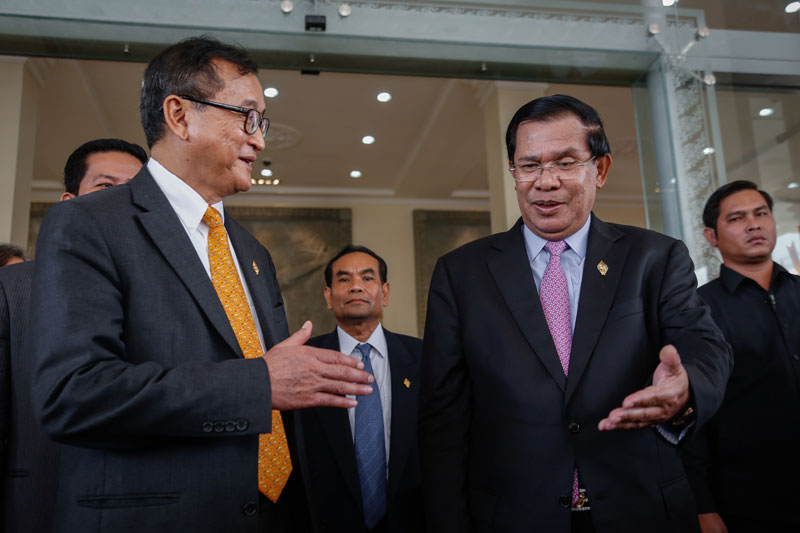The ruling CPP and opposition CNRP have agreed to a seven-point code of conduct laying out what party members are allowed to say in public speeches under the current “culture of dialogue,” according to a joint statement released by the parties on Friday.
The talking points that must be avoided include some of the most common rhetoric used by both parties, banning the CNRP from employing anti-Vietnamese sentiment against the CPP and the ruling party from threatening arrest or civil war.
The statement—signed by Prime Minister Hun Sen and CNRP President Sam Rainsy—included a number of banned phrases that were laid out in a letter from CPP Secretary General Say Chhum to the party’s rank-and-file earlier in the week, calling on them to monitor CNRP officials and report violations of the culture of dialogue.
Those include the use of “rude words and insults” such as “Vietnamese head with a Cambodian body,” “communist dictator,” “Vietnamese puppet,” “person who sells their nation” and “leader of the thieves,” according to the statement.
Also among the phrases that the statement said must be avoided were some of Mr. Hun Sen’s favorite rhetorical themes. The parties have agreed to “avoid threats and intimidation such as the use of words, ‘arrest and jail’ and ‘war will occur,’” according to the statement.
Before and after the 2013 national election, Mr. Hun Sen repeatedly warned that his removal from power would lead to civil war, and more recently threatened legal action against deputy opposition leader Kem Sokha for supposedly attempting to illegally overthrow the government through mass demonstrations.
The parties must also refrain from saying “when the water is high, fish eat ants; and when the water recedes, ants eat fish,” a Khmer idiom that has been used in the political arena to describe the shift that might occur should the CPP lose power.
CPP spokesman Chhim Phal Virun said on Friday that the new code of conduct was not legally binding, but served as a concrete framework for party leaders to disseminate among grassroots activists.
“So it’s up to the leaders of the two parties to do whatever [they can] to educate their party’s supporters about the implementation of the culture of dialogue,” Mr. Phal Virun said.
“If there is a case of a politician, a lawmaker or a political figure who does not respect [the code of conduct], it is the responsibility of that party’s leaders to admonish them,” he added.
CNRP spokesman Yim Sovann said an agreement laying out exactly what can and cannot be said by the parties was necessary for a “smooth” implementation of the culture of dialogue, adding that he was optimistic both parties would adhere to their word.
“I am not pessimistic, I am optimistic about everybody respecting the statement, and with honor and with loyalty,” Mr. Sovann said. “Let’s wait and see. Now is the beginning, so do not be too pessimistic.”
(Additional reporting by Colin Meyn)
